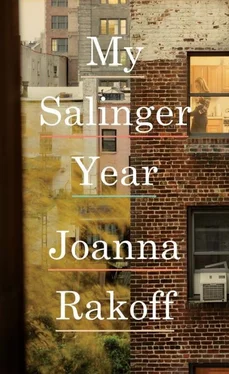The first freeze came quickly, more quickly than I remembered from my youth, when summer seemed to stretch through October. It was now November, but it felt like February: icy winds, icy rain. “We need to ask Kristina to fix the heat,” I said one night, huddled in a blanket on the couch, still in the wool skirt and sweater I’d worn to work, contemplating putting my coat back on.
“We can ask,” said Don, “but I don’t think she’s going to do it. I mean”—he laughed and gestured to the little strip that constituted our kitchen—“if she won’t install a sink, is she really going to give us a heater?”
“Isn’t heat required? Isn’t it our legal right, as tenants?” I had no idea where this information was coming from, but I was pretty sure it was correct. “I can’t stay here another winter without heat. It’s ridiculous.” My heart was pounding, strangely, erratically, at the thought of another winter in this apartment, with or without heat. Another winter with Don.
How many times had I been told that I would not meet Salinger? That he would not come in, that he had given up New York. The city—the site of his childhood, the setting for most of his stories—exhausted him. The city had prevented him from working after Catcher ’s release, when he’d lived in an apartment on Sutton Place, its walls painted black, like that of the filthy communist couple in Mary McCarthy’s The Group . The city had allowed his second wife, Claire, to abandon him, their baby in tow, on a three-day visit from Cornish, where she spent twelve, fourteen hours alone with that baby, in a snow-blocked house, while Salinger sat in a shed out back and wrote. Salinger still sat in that office—or, well, a different office, across the road from the original one—all day, and I wondered if he still wrote about New York, if his imagination still dwelled in the Glass family’s enormous East Side apartment, crammed with end tables and books and relics of Bessie and Les’s vaudeville years. Or did his mind now concern itself with the stories of the families that surrounded him in New Hampshire? One small, sad voice inside me wondered if his removal from New York hadn’t ultimately silenced him, left him without a subject. “I have a question for you,” he often said when he called. But I had questions for him, questions that had accumulated slowly over this year in which I’d tried to console, assuage, and calm his readers, in which I’d earnestly tried to stay true to his intentions, his ideas, his desires.
On a blustery November afternoon, a tall, slender man strode slowly through the finance department, glancing to his left and right with confusion. He wore a pressed flannel shirt tucked into jeans that, too, appeared to have been pressed and his silver hair parted deeply on one side, combed and Brylcreemed in the style of the 1950s and 1960s. No , I thought, though even from afar I could see that this man had large, dark eyes and truly enormous ears, the sort of ears I now knew he’d also bequeathed to poor, doomed Seymour Glass. He was making slow, steady progress toward me, a look of mild panic on his face. I stood up with the intention of running over to Salinger—for that had to be who this was, though his visit had not been mentioned to me—and guiding him to my boss’s office, then froze, hovering over my typewriter. If I ran over to help him, would I seem like one of those assistants I’d been warned about? The ones who tried to slip Salinger their stories and gleefully leaked his phone number? Before I could resolve this question, my boss came running out of her office. “Jerry,” she cried, her voice oddly choked with emotion. He’d not been into the office in years, I knew, and I wondered if he looked visibly older, aged, more frail, than the last time she’d seen him. She took his long arm in one of hers, as if to steady him, and embraced him with the other. “Jerry, there you are! It’s so good to see you.”
“Good to see you, good to see you,” he said, smiling down at her. Arm in arm, they made their way to my desk, behind which I still stood, frozen. I had thought that in such a situation my boss would be tense, nervous, but instead she appeared radiant, relaxed, excited. The obvious occurred to me: She truly liked Salinger. Adored Salinger. Her job—I already knew—was far more than a job to her. But so much of her work involved tending to the interests of the dead I hadn’t thought at all about what such devotion meant in terms of her relationship with the living. She was Salinger’s conduit to the world, his protector, his explainer, his mouthpiece. She was a part of his life, and he hers. She was his friend.
“Joanna, come out here and meet Jerry,” she said, smiling. For the first time since early June, her cheeks had color in them. With a nod, I obeyed, extricating myself from my bulky desk with more care than usual, for I was certain I was going to trip on a wire or bang my shin on a drawer or in some way embarrass all of us with my starstruck clumsiness. My legs seemed to be made of some pliable but heavy substance, like liquid lead. Somehow, though, I found myself standing in front of my boss and Salinger— Jerry —resisting the urge to smooth my skirt.
“Jerry,” said my boss, gesturing to me. “This is Joanna, my assistant.”
“Hello, hello,” he said, taking my hand in one of his own and holding it as much as shaking it. His hands were extraordinarily large and warm and dry. “We don’t really need an introduction. We’ve spoken on the phone many times.” In person, his speech was less garbled, his voice less loud. He looked at me, dark eyes shining, as if for confirmation.
“We have,” I agreed.
“Well, it’s wonderful to finally meet you.” He still had my hand in his.
“It’s wonderful to meet you, too,” I parroted back at him, idiotically, resisting a strong and bizarre—and inexplicable—urge to hug him. It was easy to imagine my boss, briefing her next assistant: “No matter how close to his work you feel, you are not to embrace him.”
I was also thinking about those letters in my desk. There were, at that exact moment, three half-drafted responses sitting in the drawer with the fan letters. Irrationally, I feared that Salinger might somehow open the drawer and discover them, this breach of policy, of his instruction.
“ Well,” my boss said, clapping her hands together as if to startle me out of my misplaced anxiety. “We have a lot to discuss. Let’s get to it. Jerry. Why don’t you come sit down for a bit, and then we’ll go to lunch?”
“That sounds perfect,” said Salinger, and he followed my boss into her office, towering over her small form. The contracts for the “Hapworth” book were drawn up. I myself had typed and retyped multiple drafts of the contract until we found a format that was amenable to Salinger. This, of course, also fell under the category of highly irregular: publishers drew up contracts, not agents. But in this case, the publisher was so small it wasn’t even clear if he had a standard contract and if he did it certainly wouldn’t have applied to a book by J. D. Salinger. My boss had written the contracts herself, and perhaps Jerry was here to sign them, in the dark confines of my boss’s office, the door to which, as I watched, closed with a resolute click.
In my desk lay the letter from Winston-Salem, two neatly typed pages, unfurled from a laser printer, and ending:
I’ll write you again soon. I can hardly wait. Anyway, my line of thought is this: if I was the guy who put myself onto paper and I came out in the form of “The Catcher in the Rye,” I’d get a bang out of the bastard who had the nerve to write me a letter pretending (and wanting) to be able to do the same thing.
Читать дальше












